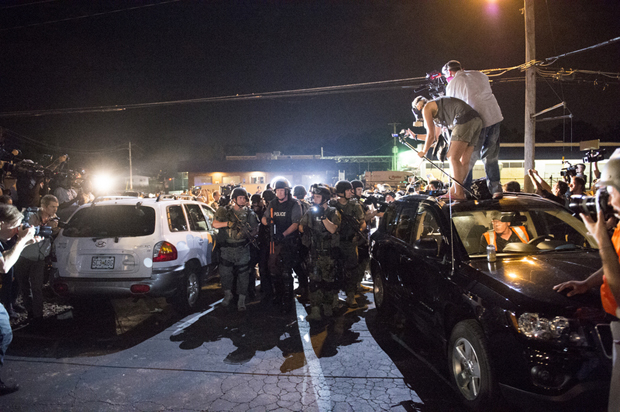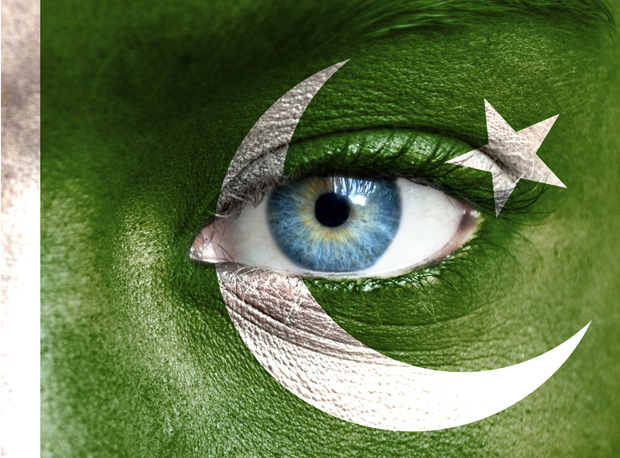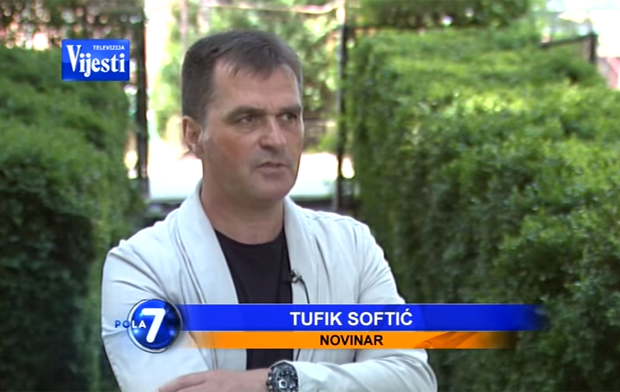21 Aug 2014 | Americas, News and features, United States

A number of journalists have been arrested while covering the protests in Ferguson, Missouri (Photo: Abe Van Dyke/Demotix)
As news spread of a video showing the murder of American journalist James Foley by the Islamic State (ISIS), journalists and Middle East watchers were unanimous on social media: do not watch the film. And for God’s sake do not post links to the film anywhere. Do not give the killers what they want.
The descriptions were brutal enough. They echoed back over a decade, to the murder of Daniel Pearl by Al Qaeda linked terrorists in Pakistan 2001.
There is a very specific message in the public execution of journalists. It’s a hallmark of extremism, in that it signifies that your movement is far beyond attempting to use the press to “get the message out”, to garner support. This is not about rational grievances the international community could address. This is not about convincing anyone who isn’t already open to your ideas. It’s about rejecting traditional ideas under which the press operates.
But this is partly possible because the likes of ISIS no longer need the attention of press to reach the world. Much has been made of the group’s social media presence. It’s genuinely impressive, and, importantly, clearly the work of people who have grown up with the web; people who are used to videos, Instagram, sharable content. They are, to use that dreaded phrase, “digital natives”. They understand the symbolic power of murdering a journalist, but they see themselves as the ones in charge of controlling the message.
Media workers are increasingly targeted, while the previous privileges they enjoyed fade away.
As I sat down to write this column, the number of journalists arrested while covering disturbances in Ferguson, Missouri stands at 17. According to the Freedom of the Press Foundation, this number includes reporters working for German and UK outfits, as well as domestic American media.
Journalists have apparently been threatened with mace. An Al Jazeera crew had guns pointed at them and their equipment dismantled. A correspondent for Vice had his press badge ripped off him by a policeman who told him it was meaningless (in slightly coarser language).
The Ferguson story is a catalogue of things gone wrong: racism, disenfranchisement, the proliferation of firearms, a militarised police force (a concept that goes far beyond mere weaponry; this is law enforcement as occupying force rather than as part of a balanced democracy). To single out the treatment of media workers may seem a little self serving, but there is good reason to do so.
We are used to telling ourselves by now that journalism is a manifestation of a human right — that of free expression. Smartphones, cheap recording equipment, and free access to social media and blogging platforms have revolutionised journalism; the means of production have fallen into the hands of the many.
This is a good thing. The more information we have on events, surely the better. But one question does arise: if we are all journalists now, what happens to the privileges journalists used to claim?
Official press identification in the UK states that the holder is recognised by police as a “bona fide newsgatherer”. As statements of status go, it seems a paltry thing. But it does imply that some exception must be made for the bearer. The recognised journalist, it is suggested, should be free to roam a scene unmolested. One can ask questions and reasonably expect an answer. One can wield a video or audio device and not have it confiscated. One can talk to whoever one wants, without fear of recrimination.
That, at least, is the theory. But in Britain, the US and elsewhere, the practice has been changing. Whether during periods of unrest or after, police have shown a disregard for the integrity of journalists’ work. The actions of police in Ferguson have merely been part of a pattern.
The question is whether we can maintain the idea of journalistic privilege when everyone is a potential journalist.
During the legal tussles over the case of David Miranda, the partner of former Guardian writer Glenn Greenwald, an attempt was made to identify persons engaged in journalistic activity, without necessarily being employed as journalists.
Miranda was detained and searched at Heathrow airport as he was believed to have been carrying files related to Edward Snowden’s NSA leaks, with a view to publication in the Guardian, though he is not actually a journalist himself.
The suggestion made by Miranda’s supporters (Index on Censorship included) is that the activity of journalism is what is recognised, rather than the journalist.
This may be applicable in circumstances such as a border search, but how would it apply in the heat of the moment in somewhere like Ferguson, or during the London riots, or any of the recent upheavals where citizen footage has proliferated. If someone starts recording a confrontation with the authorities, are they immediately engaged in journalistic activity? Or does journalism depend on what happens to your video, your pictures, your tweets?
When everyone is a journalist, is anyone?
This article was posted on August 21, 2014 at indexoncensorship.org
29 Jul 2014 | Asia and Pacific, News and features, Pakistan

(Image: Aleksandar Mijatovic/Shutterstock)
In March, Pakistani columnist Raza Rumi was injured in a gun attack that killed his driver. Weeks later, Hamid Mir, star journalist of Geo TV, Pakistan’s biggest TV station, was shot six times. Luckily, both survived, and managed to avoid becoming part of a bleak statistic: Since 1992, 30 journalists have been murdered in Pakistan; 28 with impunity.
Against this backdrop, a group of experts on Pakistan and its media came together, under the auspices of the Commonwealth Journalists Association and the Institute of Commonwealth Studies at the University of London to discuss the threats facing the country’s journalists. In a discussion chaired by BBC presenter Owen Bennett Jones, former High Commissioner of Pakistan Wajid Shamsul Hasan, Kiran Hassan of the International Institute of Strategic Studies, BBC Urdu Service Editor Aamer Ahmed Khan, New York Times Pakistan Bureau Chief Declan Walsh and renowned journalist and author Babar Ayaz tried to answer the question, How safe is it to be a journalist in Pakistan?
Censorship in Pakistan used to be straightforward, explained Khan. Certain topics were simply off limits. Today, the situation is more complicated and more confusing. Threats to journalists and press freedom take many different shapes, and come from many different sources, including the government, extremists like the Taliban, the intelligence service ISI and powerful media owners.
There are currently 84 different cases against Geo TV, of which 53 are over blasphemy. You cannot defend yourself against that, said Khan. Ayaz raised a similar point when arguing that extremists are the biggest threat to the media. The government might put a person in jail, but these extremist groups will kill for their beliefs, Ayaz said.
While Geo TV and ISI have long been fighting behind closed doors, the case of Hamid Mir created an “open battlefield”, explained Walsh, who was expelled from Pakistan in May 2013. The station aired reports linking the security services to the attack.
Walsh also brought up the ownership issue within the Pakistani television landscape, which he says has gone from “zero to 100” in the past few years. The country today boasts some 90 TV stations. Editorial control remains with media owners, according to Hassan.
But even journalists themselves did not escape criticism. Sections of the media are responsible for the current situation through irresponsible reporting, said Hasan. Quite a few were “playing with fire” by earlier glorifying the Taliban as peacemakers, he explained. Khan also highlighted corruption within the media as a “novel form of censorship”. However, as Khan pointed out, it is difficult for the Pakistani media to be responsible, without enabling them to be responsible. Most of the information that effects people’s lives is under strict control by authorities, he said.
Hassan, however, argued that there has been some progress. Journalists, and by extension the threats they face, are more visible and garner more attention today. She also pointed out that despite part closures, all Pakistan’s TV stations are still running. There was some talk of the role of media regulation in improving the situation, and Hassan said she had hopes for Pembra, the Pakistan Electronic Media Regularity Authority.
Yet, the overall conclusion was that Pakistan is not a safe place to be a journalist — illustrated well by Walsh explaining how, for the first time since he’s covered Pakistan, The New York Times recently had to use a pseudonym to protect their reporter on the ground.
Hasan summed it up: “The establishment doesn’t want the media to be as free as it can be.”
This article was published on July 29, 2014 at indexoncensorship.org
25 Jul 2014 | Mapping Media Freedom, Montenegro, News and features

Seven years after the brutal attack that nearly took the life of journalist Tufik Softic, Montenegrin police detained two men suspected of involvement of his attempted murder. For media unions and observers, the detentions were long overdue, but emblematic of the atmosphere of impunity in Montenegro.
According to police, the men — VL and IA — were arrested in Budva on 17 July and charged with attempted murder in the 2007 attack on Softic, a reporter for the opposition daily newspaper Vijesti. After questioning by the state prosecutor, who confiscated their passports, the men were released the same day. Minister of Interior Rasko Konjevic also issued a statement on the case.
In November 2007, Softic was brutally beaten in front of his home by two hooded assailants wielding baseball bats. Then in August 2013, an explosive device was thrown into the yard of Softic’s family home. The journalist has been provided constant police security since February 2014.
OSCE Representative on Freedom of the Media Dunja Mijatovic welcomed the arrest of the two suspects for the attack on Softic. She also urged, “authorities of Montenegro to persist until all attacks on journalists, especially the murder of Dusko Jovanovic in 2004 are resolved and the perpetrators and masterminds are brought to justice”.
Journalists, the Media Union and NGOs emphasize that the atmosphere of impunity that has been created in Montenegro concerning attacks on journalists is the biggest threat to media freedom. The groups put the responsibility for the climate on authorities.
NGO Human Rights Action (HRA) highlighted the perilous state of journalism in their report Prosecution of Attacks on Journalists in Montenegro. The HRA outlined 30 cases of threats, violence and assassinations of journalists as well as attacks on media property between May 2004 and January 2014.
“Most of these attacks have not been clarified to date. In most cases certain patterns can be observed, for example: victims are the media or individuals willing to criticize the government or organized crime,” said the report.
One-third of all the incidents happened in the last year. For HRA, this is clear evidence that the atmosphere of impunity is escalating and inviting more attacks on journalists.
“Such an atmosphere of impunity threatens journalists in particular, who are often victims of unresolved attacks. If the state treats these attacks passively, it becomes responsible for the suppression of freedom of speech, the rule of law and democracy”, the group reported.
The European Parliament issued a resolution on the 2013 progress report on Montenegro expressed “grave concern about the increase in verbal and physical intimidation of journalists,” and “calls for all threats and attacks against journalists to be adequately investigated and prosecuted, including unresolved previous offences.”
UN Special Rapporteur on the promotion and protection of the right to freedom of opinion and expression, Frank La Rue, undertook an official visit to Montenegro from 11 to 17 June 2013. In the report that followed, he recommended that “the identification of responsibilities in all cases of violence and intimidation against journalists must be achieved without delay, so perpetrators are brought to justice.”
That police needed seven years to question any suspects in the brutal assault on Softic “could be used as an indicator of effectiveness and dedication of the police in resolving these cases”, underlined Marijana Camovic, chief of the Montenegrin Media Union. “Yes”, she said, “we welcomed the detention of two suspects, but let’s have in mind that this is just one of the many cases that need to be resolved.”
For the Media Union, it is a common occurrence for criminals and people with political ties to threaten, berate and attack journalists. “Nowadays journalism is the most dangerous profession in Montenegro and that is why we need extra protection,” said Camovic.
Human Rights Action has proposed the introduction of two new and amendments to criminal offenses: “Grave types of murder” and “Serious bodily injury” with the aim of increased protection for journalists in performing professional duties. In the same manner, the Media Union is advocating for similar amendments so journalists could have protection under the law on a par with police officers.
In December 2013, the Montenegrin government established a commission for monitoring actions of authorities in the investigation of cases of attacks on journalists. As a result of their work, in January 2014, Dusko Markovic, a deputy prime minister and justice minister, was questioned because it was alleged that he withheld information on the murder of Dusko Jovanovic, the editor-in-chief of the opposition newspaper Dan, in 2004. Montenegrin media reported that Markovic was the head of the secret service at the time.
More reports from Montenegro via mediafreedom.ushahidi.com
Arson attack on vehicles owned by Montenegrin daily
Politician and journalist discredit TV station
This article was posted on July 25, 2014 at indexoncensorship.org
7 Jul 2014 | Draw the Line, Events, Young Writers / Artists Programme
As cheers from the World Cup rumbled in the background, Index set up an online platform to debate the tussle between sport and freedom of speech. As part of the Draw the Line series of discussions, last month’s question was: Should repressive regimes be banned from sport? If countries have poor human rights record, do they deserve to participate?
Twitter erupted with opinions. Immediately the question of defining a repressive regime was raised – whose duty would it be to decide? Although many might agree that Iran’s government-controlled press was anti-free speech, would the US’s treatment of whistleblower Edward Snowden fall into the same category?
Others argued that banning offending countries would leave their crimes in the shadows. Instead they believed oppressive regimes should suffer the spotlight of global media – hoping that the publicity would encourage conversation and spark change.
Opinions seemed split at the first Draw the Line event, where ten young human rights activists gathered to discuss the same issue. Although some declared passionately that repressive regimes must be punished, there were fears that a ban would misdirect that punishment – affecting a country’s people rather than its leaders.
Defining the World Cup’s worst countries for free speech – or the “group of death” – seemed to make a much easier task for the young activists. Examining democracy, civil liberties, press regulations, internet freedom and corruption, participants unanimously decided that Cameroon, Iran, Nigeria and Russia qualified as the countries that held freedom of speech in the lowest regard.
As the debate evolved, a common consensus emerged: A campaign should be set up to stop countries that stifle free speech from hosting high profile sports events, like the world cup. With host countries benefiting from huge boosts to the economy, infrastructure and community spirit, this should be incentive enough to halt human rights abuses without punishing innocent citizens by banning countries completely.
More about Draw the Line



